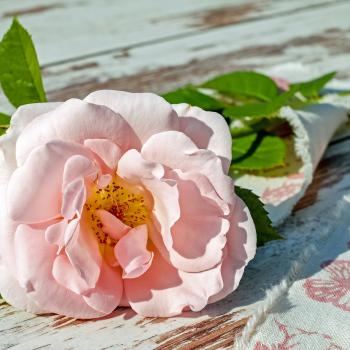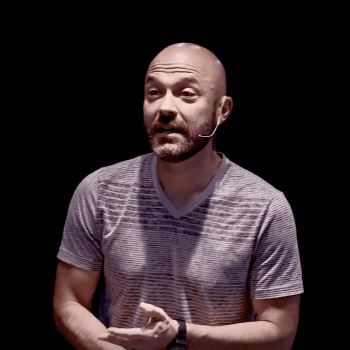Over and over and over again as a girl, I was taught that marrying through a parent-guided courtship would mean I wouldn’t have any regrets. My mom used to talk about her past relationships, before she met my dad, with a great deal of regret. She wished she hadn’t done things she did and dated the people she did. She regretted it, she would tell me, and she wanted to save me from having regrets of my own. And the magic relationship secret that would save a couple from having any regrets was simple—courtship.
Check out this paragraph from the Duggar’s 7 Rules of Courtship:
The Duggars ask their daughters and their beaus to set their own boundaries on the physical side, and to share those boundaries with them. In Jessa and Ben’s case, the couple decided to give each other hugs when they are greeting or saying goodbye, or posing for a picture. “But they have committed to waiting for the first kiss till marriage,” Jim Bob says. They will also wait until they are engaged before they hold hands. “We believe it’s best for them to save the physical part for marriage,” says Michelle. “That way there’s no regrets.”
But today, I’m noticing a bit of a pattern. Last month someone posted in a homeschool alumni group I’m in about regrets she had about her courtship, and I watched, fascinating, as one after another hopped on to share their own regrets. They wished they’d just kissed and had done with it, that they had been allowed genuine privacy, that they hadn’t waited until marriage to have sex. Yes really—I’ve spoken with scads of homeschool alumni who regret waiting until marriage to have sex. Even those who don’t regret that in particular often regret other facets of their courtship experience.
It turns out that saving sex for marriage does not mean you will have no regrets. It turns out that going through a courtship process doesn’t mean you will have no regrets. It turns out that there is no perfect formula for having no regrets.
My own courtship was incomplete, in a sense, because I jumped ship and refused to follow the rules halfway through. Still, the things I regret have nothing to do with the parts where I deviated from the courtship model and everything to do with the parts where I followed the courtship model. I regret that I didn’t date before meeting my husband. I regret that I made our relationship so serious so quickly. I regret that I was so afraid of physical contact for so long. I regret that I gave my husband a hard time about having previous girlfriends. I regret that I made such a huge deal out of everything.
Don’t get me wrong, I’m extremely glad I married my husband. I simply wish our getting-to-know-you period had been less fraught. I wish we’d simply dated. I regret courting. And you know what? That’s something that wasn’t supposed to be able to happen. Still, I’m lucky. I know others who courted and went on to divorce. They explain that courtship made things too serious too fast, that courtship prevented them from actually getting to know each other by denying them privacy, etc. Courtship became a regret they had to figure out how to undo.
For some, the regret is parental control. This, from Melissa:
Actually I can’t think of a single benefit from the parental control and pressure we had throughout our relationship. Even after we were married, it took several years for us to truly “leave and cleave”. We had never been allowed to be our own persons, and old habits died very hard. We would consult our parents and make decisions (trivial or important) based on what they told us. Eventually we progressed to where we would make our own decisions and fret about how to tell our parents what we had decided. It took four years to get to the point that we made decisions and didn’t bother to tell them at all!
For others, the regret is the overthinking. This, from Hannah Ettinger:
I missed a lot of the joy in various “firsts” because I was so busy over-thinking everything and tense and afraid of doing the wrong thing. And that’s just silly. Dating is supposed to be about learning, not getting everything right the first time.
I love Hannah’s point about dating being about learning, rather than about getting everything right the first time, because it brings me to a problem I have with the entire conversation surrounding courtship—regret is not a bad thing. Don’t get me wrong, regret is an unpleasant emotion. Still, regret is how we learn.
Take parenting as an example. There are times when, as a parent, I make a mistake and regret it—but those experiences are learning experiences. I learn, over time, how to interact with my children in positive ways—how to best deescalate conflict with this one, how to best explain a change in plans with that one—but learning cannot take place without mistakes, and mistakes mean regret. Sure, I can read parenting books and child development manuals and try to get things right the first time, but my children are individuals and I am an individual and we have our own quirks. There is no failsafe way to parent without regretting something at some point.
Now yes, you say, but what about regret in big areas—areas you can’t just fix? That’s how my parents viewed premarital sex, or dating—these were regrets, they believed, that would damage your whole life. They weren’t just things you could learn from and move on. The trouble is that here, as I pointed out, regrets can go both ways. Some may regret having premarital sex, but others will regret not having premarital sex. The same is true in other areas—you may regret not buying that house you saw when it was on the market, but if you’d bought it you might have eventually come to regret buying it.
Regret is a part of life. If we spend our entire lives fleeing it, we’re not truly living. We shouldn’t center our approach to relationships around never regretting anything. There’s no failsafe way to do that, and focusing on it like a laser is stress inducing. Instead of centering decisions on avoiding regret, we would be better off focusing on healthy relationship skills, informed choices, and tools for recognizing and avoiding abusive partners and relationship patterns. And, too, we need to give our young people tools for handling regret.
Regret is better than not living to begin with.













